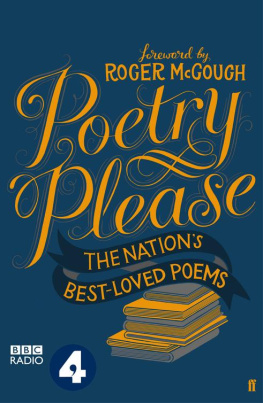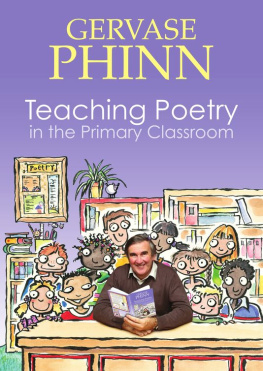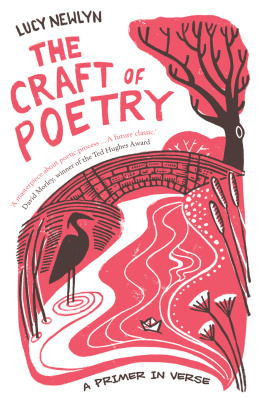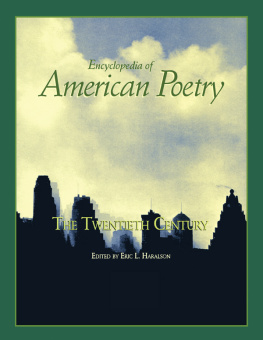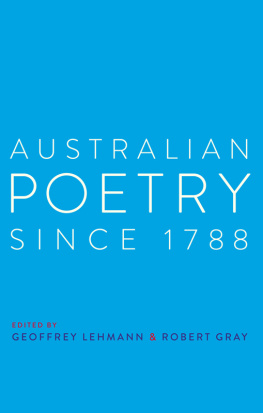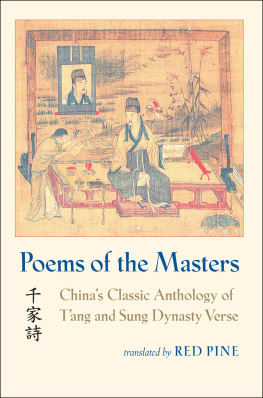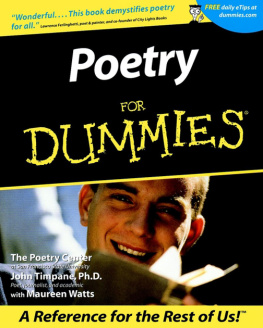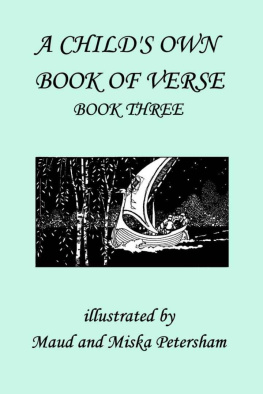Hello and welcome to BBC Radio 4s
Poetry Please and a very special edition of the worlds longest-running and most-popular radio programme devoted to poetry: a programme that is made by you, its listeners, and which broadcasts your requests so that you can hear the poems you love, the poems you need, the poems you remember and the poems youd like others to know. As we do every week in the
Poetry Please office when we are on the air, we have knelt before the fabled filing cabinets that store your requested poems and garnered this collection of favourites. The 350 poems here have all been asked for more than once in the programmes history, and reflect the very best of the nations poetic tastes since the first edition of the programme was broadcast in 1979. Many of them have been heard many times. We are forever stooping to those cabinets and drawing upon our listeners requests to make and shape the programmes. In the process we have given our knees for poetry.
But its a small price to pay. Poetry Please has been successful because it is simple. The poems we broadcast are the poems people want to hear. A line half remembered from school, a poem for a funeral, verses for a new baby or an old love poetry lodges with us and we share the shelter it offers. Moments of raw grief and sadness make up part of what we are, as well as joy and celebration. And laughter.
Although the programme takes its commitment to spreading the good news of poetry very seriously, it is never afraid to laugh at itself. All the programme has to do is narrow as far as possible the gap between a poems source and its destination. I sit in a studio with a sheaf of poems, a tray of your letters, emails and phone messages, and a couple of actors (sometimes a poet or two) and we make magic happen. The same magic is just as readily found in the pages of this book. Open it on any poem and let it all sink in: evidence of a nation whose heartbeat is poetry itself. S. J. J.
Tessimond, as well as living writers such as Paul Durcan and Billy Collins. The hope is that you too will find among these pages your own favourites, as well as discovering new voices that will resonate and uplift. Another lyrical hero is Robert Frost whose Stopping by Woods on a Snowy Evening is the most requested poem on Poetry Please, and it is worth noting that I first came to that poem not by reading it in a book, but through listening to the poet himself reading it on television. It has often been the case that the spoken rather than the written word provides the spark that ignites a poem. The chart for the Top 10 most broadcast poems appears at the end of this Foreword. Although some poems may seem difficult, and occasionally impenetrable, poetry is not elitist, and I have witnessed in my own versifying lifetime, a surge in popularity of the spoken word, and of poems that appeal to the heart as well as the head.
Hopefully we will never take for granted the soft voices that speak truths so eloquently on Poetry Please each week. Making the programme is a continuing education in itself. First in poetry: it is wonderful that so many people carry so much poetry with them, stowed in their minds and in their hearts and ready to be put to use in all sorts of ways (not always happily, it must be said we often hear from people trying to get lines of stray verse out of their heads). Second, making Poetry Please offers wider lessons in humankind: it corrects any easy notion of poetry as being exclusive, or old fashioned, or only for people whose teachers made them learn lines by rote in the old black and white days. People get on with their lives and poetry keeps pace with them it is as simple as that. Nothing that has happened to our species is beyond poetry, and poetry earns its keep by being there at every corner in every life.
On Poetry Please, on Radio 4, and here between these covers we are simply listening in on the conversation. In 2009, Poetry Please celebrated its thirtieth birthday, and to mark that occasion I wrote a cento, a Latin word meaning cloak: in other words, a poem made up of lines from other poems. The poems I chose feature frequently on the programme and there are twelve poets in all, from Thomas Hardy to Adrian Mitchell by way of John Donne and John Cooper Clarke. The poem appears overleaf. If you would like to hear a favourite poem on the programme, you can e-mail me on poetry.please@bbc.co.uk, call 03700 100 400 or write to Poetry Please, BBC Bristol BS 8 2 LR . Goodbye. Goodbye.
ROGER M c GOUGH
What a daunting pleasure it has been over the years to sit in a studio and present you to the nation @bbc.co.uk. To celebrate poetry. Seven buxom women abreast, staggering and sliding on the ice-bound road. The red wheelbarrow. A boy falling from the sky. Dappled things, borogroves and runcible spoons.
The secret ministry of frost, full moons and little Frieda. Rainbows and the liquefaction of Julias clothes. To celebrate the joy of socks. Love in the back of vans, sing the body reclining and the warming of her pearls. The way we were and the way we will be. Growing old, wearing purple, a joy to behold.
And let us not forget the vacuum cleaner and the Ford Cortina BS 8 2 LR . More feel-good than Gielgud. Rhyme, I like that stuff. Let us sleep now. To Poetry Please, a little momento, some of your favourite lines stitched into a cento. ROGER M c GOUGH
Stopping by Woods on a Snowy Evening ROBERT FROST How do I love thee? Let me count the ways ELIZABETH BARRETT BROWNING Adlestrop EDWARD THOMAS Fern Hill DYLAN THOMAS The Darkling Thrush THOMAS HARDY Dover Beach MATTHEW ARNOLD Let me not to the marriage of true minds WILLIAM SHAKESPEARE The Listeners WALTER DE LA MARE Remember CHRISTINA ROSSETTI To His Coy Mistress ANDREW MARVELL
Of writing many books there is no end; And I who have written much in prose and verse For others uses, will write now for mine, Will write my story for my better self, As when you paint your portrait for a friend, Who keeps it in a drawer and looks at it Long after he has ceased to love you, just To hold together what he was and is.
I, writing thus, am still what men call young; I have not so far left the coasts of life To travel inward, that I cannot hear That murmur of the outer Infinite Which unweaned babies smile at in their sleep When wondered at for smiling; not so far, But still I catch my mother at her post Beside the nursery door, with finger up, Hush, hush heres too much noise! while her sweet eyes Leap forward, taking part against her word In the childs riot. Still I sit and feel My fathers slow hand, when she had left us both, Stroke out my childish curls across his knee, And hear Assuntas daily jest (she knew He liked it better than a better jest) Inquire how many golden scudi went To make such ringlets. O my fathers hand, Stroke heavily, heavily the poor hair down, Draw, press the childs head closer to thy knee! Im still too young, too young, to sit alone. ELIZABETH BARRETT BROWNING
When I see birches bend to left and right Across the lines of straighter darker trees, I like to think some boys been swinging them. But swinging doesnt bend them down to stay. Ice-storms do that.
Often you must have seen them Loaded with ice a sunny winter morning After a rain. They click upon themselves As the breeze rises, and turn many-colored As the stir cracks and crazes their enamel. Soon the suns warmth makes them shed crystal shells Shattering and avalanching on the snow-crust Such heaps of broken glass to sweep away Youd think the inner dome of heaven had fallen. They are dragged to the withered bracken by the load, And they seem not to break; though once they are bowed So low for long, they never right themselves: You may see their trunks arching in the woods Years afterwards, trailing their leaves on the ground Like girls on hands and knees that throw their hair Before them over their heads to dry in the sun. But I was going to say when Truth broke in With all her matter-of-fact about the ice-storm I should prefer to have some boy bend them As he went out and in to fetch the cows Some boy too far from town to learn baseball, Whose only play was what he found himself, Summer or winter, and could play alone. One by one he subdued his fathers trees By riding them down over and over again Until he took the stiffness out of them, And not one but hung limp, not one was left For him to conquer.

